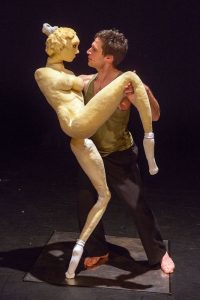First story. A naked king crawls at the feet of a woman. She is much taller than him, a goddess. High above him, she holds a bunch of grapes in her hand. Hungry he is! He wants those grapes, all of them. His body is vulnerable. It seems to shiver in the open air. But when it comes to the coveted food, he lashes out uninhibitedly. And his gaze is ugly, cold, ruthless.
Next story. A goddess with no arms dances with a man. Such infinite happiness blossoms within her that gravity seems to take a step back. It gives her wings, delicate, wafer-thin, finely woven wings that only light beings like this goddess can lift. How could anyone harm such a fragile creature?
Story three. A Cyclops waddles across the stage. Monstrously ugly and repulsive he looks, but the way he calls his sheep to him is so sweet and gentle. So how can an encounter with him turn to violence?
At The Greeks Maas Theatre/Dance plays three mytholgical stories choreographed by Duda Paiva. The performance is made for youngsters aged 9 and up, but also drags adults along and is perhaps even more disconcerting for them than for children.
Seamlessly, the endearing merges into cruelty, as do dance and puppetry.
It is wildly clever like Tim Velraeds in the first story, King, while dancing, transforms his puppet into a real-life king and gradually comes into conflict with it. Set against the cramped greed of the tyrannical male is an exalted female figure, beautifully danced by Ana Teixidó. In a magical way, she possesses every conceivable form of food.... She seems the symbol of nature with her good gifts. Teixidó exudes a beautiful unapproachability at first. This is how it has always been with nature: it could give inexhaustibly without being affected itself.
The king goes too far in his gluttony, which may be called exemplary of the voraciously consuming man of the modern West. When he snatches the woman's grapes, she falls prey to an electrified dance, still powerful but damaged. Everything she has, the king gobbles up: grapes, an ice cream, fish, and finally herself. Again, beautiful acting, in which dance and the movement of the puppet enter into a total unity and take on enormous energetic power. It grabs you by the throat when the dancer's arm slowly disappears into the king's maw. It becomes astonishingly beautiful when, at the end, the Velraeds, Teixidó and the king form one big whirl, a kind of hurricane in which everything volatilises and disappears into darkness.

The second story is about Nikè, the goddess of victory. Winning is popular among people. But a victory implies that there is also a loser. Is the doll lying silently huddled on the floor, which appears to have no arms, a winner or a loser? Besides the breathtaking dance, this ambiguity makes it impossible to take your eyes off this fragile creature. Without the dancer (Ilija Surla), she can do nothing. He picks her up and leads her into a fairytale ballet. Surla leads the puppet magisterially. It is as if you can read her thoughts on her face. At first she is a little surprised: attention from such a handsome man! Then she discovers how wonderful it is to dance, how beautifully lithe her body is. The woman is so happy that wings grow on her shoulders. This is how we know the ancient Greek images of the goddess of victory. Happiness makes her a winner. But he, the man, the human, now finds her so beautiful that he now won't let her go. He prevents her from flying and pulls off her wings. There she is again, huddled as before. Gone happiness. Gone victory. And what use are those wings to man, too delicate to carry him?
The third story Cyclops is less concise and fleshed out with less imagination than King and Nikè. The events are easy to follow, but those who take the story from Homer's Odyssey knows, is not surprised. The confrontation between Odysseus and his men with the ferocious cyclops is messy and takes too long. Nevertheless, there is much to enjoy in this part too. When the cyclops/puppet appropriates the legs of the dancer/puppeteer, we again witness brilliant illusion and movement art.
Still to be seen:
Fri 7 Nov 2014, 7pm, Wilminktheatre, Enschede
Za 8 Nov, 20.30, Lieve Vrouw, Amersfoort
Wed Nov 19, 7.30pm, Stadsschouwburg, Utrecht
Za 22 Nov, 19.30 hrs, Ins Blau, Leiden
Sun 30 Nov, 15.00, Theater a/h Spui, The Hague
Wed 10 Dec, 20.30, Schouwburg, Rotterdam
Do 11 Dec, 20.30, Schouwburg, Rotterdam
Sun 14 Dec, 15.00, Maaspodium, Rotterdam
Fri 13 Feb 2015, 19.30, Krakeling, Amsterdam
